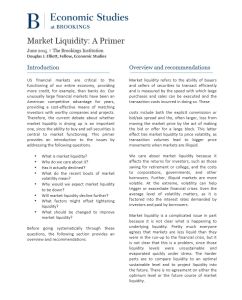Join getAbstract to access the summary!

Join getAbstract to access the summary!
Douglas J. Elliott
Market Liquidity
A Primer
Brookings Institution, 2015
What's inside?
Signs point to a decline in market liquidity, and it may get worse before it gets better.
Recommendation
A number of signs indicate that market liquidity has fallen since the 2007–2009 financial crisis. If liquidity diminishes, investors may see lower returns, greater volatility and possibly a return to crisis. While the reasons for the decline remain uncertain, regulatory changes designed to protect investors may be a contributing factor. In clear, concise language, finance expert Douglas J. Elliot explains what market liquidity is, why it’s critical to the economy, and what market participants and regulators can do to ensure liquid and well-functioning markets. getAbstract recommends this instructive article to students, financial professionals and investors.
Summary
About the Author
Douglas J. Elliott is a fellow in economic studies at the Brookings Institution.



















Comment on this summary